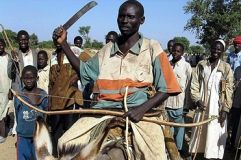Darfur refugees in Chad risk water shortages
Nov 17, 2006 (LONDON) — Tens of thousands of Sudanese refugees in Chad risk water shortages as thousands of terrified Chadians flee a spillover of ethnic violence from Sudan’s Darfur region, an aid group warned.
 Oxfam International warned it may have to cut daily rations for the Sudanese refugees living in camps in southeastern Chad to help hundreds of displaced Chadians arriving daily to safe areas near the camps.
Oxfam International warned it may have to cut daily rations for the Sudanese refugees living in camps in southeastern Chad to help hundreds of displaced Chadians arriving daily to safe areas near the camps.
Roland Van Hauwermeiren, head of Oxfam’s operations in eastern Chad, said in a statement that Oxfam’s pumping station in Goz Beida, where many displaced are arriving, is already working at full capacity for the refugee camp.
Following a visit Tuesday to Goz Beida, where more than 4,000 Chadians have arrived since last week, he warned that rations would have to be slashed if there is no more water in the ground.
“As we cannot deprive these new arrivals of water, we will have to find other solutions, such as reducing the water available every day or trucking in water, until the security situation stabilizes and people are comfortable going home,” Van Hauwermeiren said.
The state of the Chadian displaced was alarming, Van Hauwermeiren said.
“Many have arrived with nothing, and are camping under trees in a state of shock,” he said.
“People I have spoken with say that in all of their years, they cannot remember things being this bad, with such hatred and destruction choking them out of their homes,” said Van Hauwermeiren.
“Everyone wants to go home to their crops and to their regular lives but are too afraid to even consider it. The feelings of desperation among the people are overwhelming,” he said.
On Monday, the Chadian government declared a state of emergency covering much of the country after recent clashes between Arab and non-Arab communities killed hundreds of people in the east.
The Chadian government has blamed Khartoum for causing the latest bout of unrest, accusing the Sudanese government of launching “a global strategy … to destabilize Chad.”
In recent weeks, UN diplomats have spoken of the possibility of deploying a police force to Chad to protect the more than 200,000 Sudanese refugees and more than 50,000 internally displaced persons.
The war in Darfur erupted in February 2003 when rebels from minority tribes took up arms to demand an equal share of national resources, prompting a heavy-handed crackdown from the Sudanese government forces and proxy militia called Janjaweed.
(AFP)
